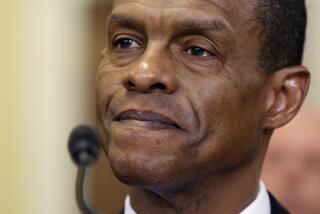Charting the Longevity of a Little Boyâs Love Affair With Men in Blue
For minority youngsters dealing with law enforcement, too often and too soon the awe turns to awful.
I have discovered that, just shy of 6, my kid is in love with men in uniform. Not quite the way Mae West claimed to be, but there is something about the combination of brass buttons, shiny boots and erect posture that manages to grab a little boyâs attention.
He points out firefighters as they stroll, tall and buff, through the aisles of the grocery store while they take turns outfitting their company with the weekâs provisions. I am impressed that, in addition to routinely going into burning buildings and saving peoplesâ lives and property, firefighters are (still mostly) men who cook. He is impressed with their boots, slickers and helmets.
When weâre on the freeway he jubilantly points out California Highway Patrol officers astride their cycles: âLook Mom, the Highway Control!â he bellows. (I donât have the heart to correct him about the name, and anyway, his way more accurately describes their function.) When we ride through the city, he practically breaks his hand waving at LAPD officers. Mostly, they wave back. Once, he was euphoric when two beat cops simultaneously gave him a smart salute as they stood on a corner.
Uniforms in general and police uniforms in particular fascinate little boys. For many years in many parts of America, it was a mutual adoration. When I was the kidâs age, cops were the ones who called your mother when you were lost or helped you cross streets near your school. They were the guys who handed out full-sized candy bars (and junior deputy badges) on Halloween. They gave you the tour of the local police precinct (âThis is a visit,â one would intone as he locked giggling fifth graders into an empty holding tank for two minutes. âDonât let me see any of you back here for anything other than a tour.â)
But urban America hasnât always had the same experience, and by the time many little boys in inner city neighborhoods reach junior high school, their love affair with men in uniform is over.
If you live in a poor neighborhood, if you are an easily recognizable minority, your encounters with the police department may not be as romantic as my almost 6-year-oldâs have been so far. In Los Angeles, the Christopher Commission, convened in the wake of the 1992 riots, asserted that police abuse of the people they had sworn to protect and serve was more than occasional and had in fact contributed to the poisonous relationship between cops and communities in many parts of Los Angeles. I, who have had cordial personal relationships with the police but who have witnessed others not so lucky, am torn.
Part of me grins inside when an officer grins back at the kid. The other part wants to caution him: It may not always be this way. There may come a point when your curiosity is seen as threatening, when youâll be stopped for inexplicable reasons, on foot or in your car. When sometimes the only logical explanation will be youâre young, black and male.
I have been in neighborhoods where boys not much older than my own jeer and whistle at the police, and warn one another--and older people--of their imminent arrival: âFive-Oâs coming!â (Or Kojak. Or just pigs.) Theyâve seen their uncles, brothers, neighbors assuming the position. Around the kitchen table, theyâve heard the stories of how friends and family have arbitrarily been stopped. Or searched. Or questioned about their associations. Often none too politely, either. These children have watched an ongoing war, and like children of war everywhere, they are cynical and skittish. The police will have to earn their trust.
For the time being, I am holstering my skepticism. I tell the kid yes, cops have guns, but they use them only when they absolutely have to. And they donât like using them very much. I tell him that police guns are more for defense--to save their own lives, their partnersâ or innocent bystandersâ. I resist the urge to add a caveat when he gives me a huge smile when heâs been acknowledged with a crisp, âHey, buddy, howâre you doinâ?â or an officer takes the time to answer his childish questions about how, exactly, the law keeps order. Iâd like for his love affair with men in blue to last well beyond 6. Whether it does--for him and many thousands of other little boys in different parts of the city--depends, in large part, on how well Bernard Parks does his job.
I wish him luck.
More to Read
Sign up for Essential California
The most important California stories and recommendations in your inbox every morning.
You may occasionally receive promotional content from the Los Angeles Times.










